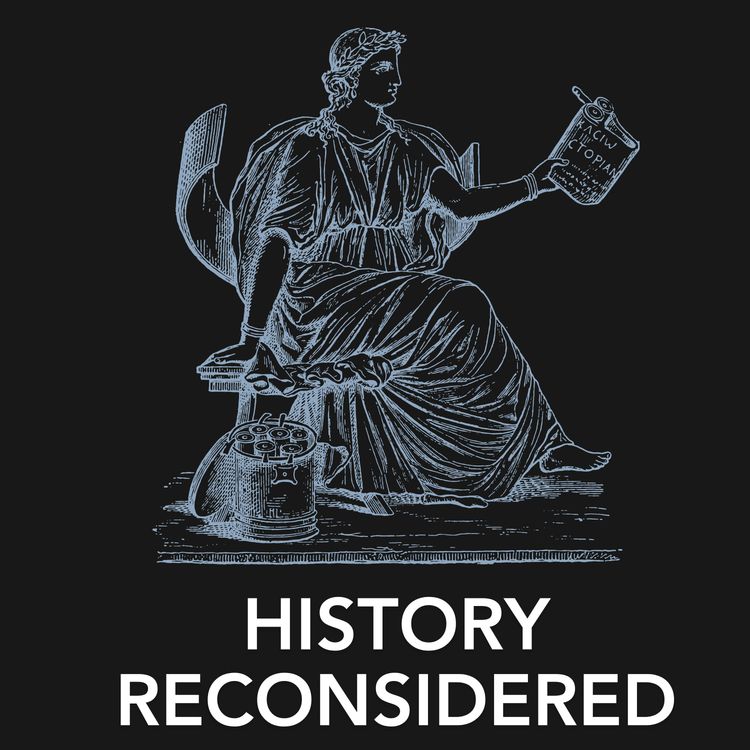Share

History Reconsidered
World War II Begins and France's Third Republic Falls
Ep. 20
•
On this week's episode of History Reconsidered, Sumantra Maitra and Jarrett Stepman talk about the initial stages of World War II, including the fall of Poland, Finland and France.
They explain the hopeless position Poland was put in and the reasons for France's quick disintegration. Maitra and Stepman also talk about how Germany's quick victories over Poland, the low countries, and France and the Soviet Union's difficulties in Finland led to Hitler's decision to launch Operation Barbarossa.
More episodes
View all episodes

26. Was Winston Churchill the Chief Villain of World War II?
01:01:12||Ep. 26On this week's episode of History Reconsidered, Sumantra Maitra and Jarrett Stepman address the online controversy over Winston Churchill and World War II.In an interview with Tucker Carlson, amateur historian Darryl Cooper--who goes by the social media pseudonym "Martyr Made"--argued that it was Churchill who ultimately drove events leading to World War II.Maitra and Stepman give their take on what led to World War II, how we should view Churchill, and the problem with the decline in the credibility of academic institutions. Maitra explains how many of Adolf Hitler's aggressive actions proved his irrationality as a statesman, but concludes that no one individual was responsible for the war taking place.This episode covers other revisionist histories of the war, including the idea that Joseph Stalin was the primary culprit of launching World War II and manipulated the United States into giving the USSR domination over Eastern Europe.
25. Jefferson and Madison at War
53:52||Ep. 25On this week's episode of History Reconsidered, Sumantra Maitra and Jarrett Stepman continue their series on presidents at war with a discussion about Thomas Jefferson and James Madison. First, they briefly talk about the John Adams administration. Adams dealt with a fraught time in American foreign policy. He was able to avoid outright war with France but suffered widespread political opposition due to the passage of the Alien and Sedition Acts.Federalist policy unpopularity led to the "revolution" of 1798 and the election of Jefferson. Jefferson used the small blue water navy to deal with the Barbary pirates but much greater challenges loomed. His successor James Madison conducted America's first major war since the American Revolution, the War of 1812. Was this a conflict the United States should have avoided entirely? Maitra and Stepman discuss all these things and much more.
24. George Washington's Strategic Genius
57:40||Ep. 24On this week's episode of History Reconsidered, Sumantra Maitra and Jarrett Stepman begin a new series about presidents in war time starting with the man first in war, first in peace, and first in the hearts of his countrymen: George Washington.Maitra and Stepman explain how Washington's role as commander-in-chief of the Continental Army became a model for the eventual office of the presidency. They explain how Washington crafted a brilliant strategy to ultimately defeat the British Empire, secure independence for a fledgling nation, and bestow the blessings of liberty to the new nation and its posterity.Finally, they talk about the tricky international situation during Washington's time as president and his farewell address, which became a model of American foreign policy realism.
23. The Sources of Russian Aggression
58:21||Ep. 23On this week's episode of History Reconsidered, Sumantra Maitra and Jarrett Stepman talk about the history of NATO and the sources of Russian aggression both historically and today.They cover Maitra's new book called, fittingly enough, "The Sources of Russian Aggression: Is Russia a Realist Power?" You can pick up the book on Amazon here: https://www.amazon.com/Sources-Russian-Aggression-Russia-Realist/dp/1666935840/Maitra explains what the original purpose of NATO was and how it has evolved since the end of the Cold War. What began as a 12-member alliance to contain the Soviet Union has grown to a 32-member coalition with more abstract goals like democracy promotion and human rights. Is the expanded NATO really stronger?Also, Maitra and Stepman explore how much the friction between the United States and the "West" more broadly is the result of temporary differences in interest or a deeper conflict of visions. Are good relations with Russia possible in the near future?
22. The Atomic Bombings of Japan and the End of World War II
56:32||Ep. 22On this week's episode of History Reconsidered, Sumantra Maitra and Jarrett Stepman talk about the atomic bombings of Hiroshima and Nagasaki and the end of World War II.Were the bombings necessary or could the war with Japan have been resolved in a better way? Maitra and Stepman talk about the realities of an invasion of the Japanese homeland and what the would have meant for both the Allies and the Japanese people. They also talk about the differences between how World War II ended compared to many modern wars.The episode ends with a brief exploration of the question: "Who really won World War II?"
21. How the U.S. Transformed World War II, and How the War Transformed the U.S.
58:48||Ep. 21On this week's episode of History Reconsidered, Sumantra Maitra and Jarrett Stepman talk about the U.S. entry into World War II after the Japanese bombing of Pearl Harbor.With the U.S. entry into the war, the conflict became global. The Allies would have significant manpower and materiel advantages that could not be matched by the Axis. Yet, wars are not won by materiel alone. Maitra and Stepman talk about the challenges that the Allies faced, especially in coordinating strategic objectives. They also talk about how the Axis entirely failed to coordinate through the war and why that doomed their chances of winning.
20. The Sinking of the Bismarck and the Evolving Nature of War
01:02:54||Ep. 20On this week's episode of History Reconsidered, Sumantra Maitra and Jarrett Stepman talk about the middle stages of World War II when the Axis powers were ascendent and victory for Great Britain seemed bleak. They discuss whether Germany's cross channel invasion of the British Isles could have succeeded.Maitra and Stepman talk about the sinking of the Bismark, one of the largest and greatest battleships ever built. It was ultimately stopped not by another powerful man-of-war, but by the torpedo dropped by an airplane. It was a sign that the age of the battleship was over and the age of the aircraft carrier and air power had come. Are we seeing a similar change in warfare today where the aircraft carrier has become merely an impressive, but fragile waste of resources?
19. Great Britain and the United States on the Eve of War
01:03:52||Ep. 19On this week's episode of History Reconsidered, Sumantra Maitra and Jarrett Stepman talk about the United States and Great Britain on the eve of World War II. Stepman and Maitra explain the "America First" movement in the United States and why most Americans were adamantly opposed to war. Many Americans believed that involvement in the conflict would change the country forever, and it did.Maitra makes a spirited defense of Neville Chamberlain, explaining that while the British statesman got some things wrong, he was not the "wimp" caricature that he's often been portrayed as. Stepman and Sumatra talk about why the British Empire had reason to be cautious about engaging in another great conflict with Germany and why the United States was the U.K.'s only hope of victory once the war began and France had been defeated.